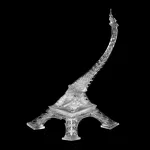Dynamic 3D printing process features a light-driven twist
Light provides freedom to control each layer and improves precision and speed
2021-02-03
(Press-News.org) The speed of light has come to 3D printing. Northwestern University engineers have developed a new method that uses light to improve 3D printing speed and precision while also, in combination with a high-precision robot arm, providing the freedom to move, rotate or dilate each layer as the structure is being built.
Most conventional 3D printing processes rely on replicating a digital design model that is sliced into layers with the layers printed and assembled upwards like a cake. The Northwestern method introduces the ability to manipulate the original design layer by layer and pivot the printing direction without recreating the model. This "on-the-fly" feature enables the printing of more complicated structures and significantly improves manufacturing flexibility.
"The 3D printing process is no longer a way to merely make a replica of the designed model," said Cheng Sun, associate professor of mechanical engineering at Northwestern's McCormick School of Engineering. "Now we have a dynamic process that uses light to assemble all the layers but with a high degree of freedom to move each layer along the way."
Sun led the research, which lies at the intersection of two of his main areas of focus: nanofabrication and optics. The study was published today (Feb. 3) by the journal Advanced Materials.
In the paper, the researchers demonstrate several applications, including 3D printing a customized vascular stent and printing a soft pneumatic gripper made of two different materials, one hard and one soft. A double helix and a tiny Eiffel Tower are two other printed examples in the study.
The Northwestern process uses a robotic arm and a liquid photopolymer that is activated by light. Sophisticated 3D structures are pulled out from a bath of liquid resin by a high-precision robot with enhanced geometric complexity, efficiency and quality compared to the traditional printing process. The arm is used to change the printing direction dynamically.
"We are using light to do the manufacturing," Sun said. "Shining light on the liquid polymer causes it to crosslink, or polymerize, converting the liquid to a solid. This contributes to the speed and precision of our 3D printing process -- two major challenges that conventional 3D printing is facing."
The continuous printing process can print 4,000 layers in approximately two minutes.
"This is a very fast process, and there is no interruption between layers," Sun said. "We hope the manufacturing industry will find benefit in it. The general printing method is compatible with a wide range of materials."
Looking to the future, Sun said this printing process could be applied to other additive as well as traditional subtractive manufacturing processes, providing a bridge toward a truly hybrid process.
INFORMATION:
The title of the paper is "Conformal Geometry and Multimaterial Additive Manufacturing through Freeform Transformation of Building Layers."
[Attachments] See images for this press release:

ELSE PRESS RELEASES FROM THIS DATE:
2021-02-03
How do the normal pains of everyday life, such as headaches and backaches, influence our ability to think? Recent studies suggest that healthy individuals in pain also show deficits in working memory, or the cognitive process of holding and manipulating information over short periods of time. Prior research suggests that pain-related impairments in working memory depend on an individual's level of emotional distress. Yet the specific brain and psychological factors underlying the role of emotional distress in contributing to this relationship are not well understood.
A new study, titled "Modeling neural and self-reported factors of affective distress in the relationship between pain and working memory in healthy individuals," and published in the journal ...
2021-02-03
LOS ANGELES - New research from the Center for Cardiac Arrest Prevention in the Smidt Heart Institute has found for the first time that during nighttime hours, women are more likely than men to suffer sudden death due to cardiac arrest. Findings were published in the journal Heart Rhythm.
"Dying suddenly during nighttime hours is a perplexing and devastating phenomenon," said Sumeet Chugh, MD, senior author of the study and director of the Center for Cardiac Arrest Prevention. "We were surprised to discover that being female is an independent predictor of these events."
Medical experts are mystified, Chugh says, because during these late hours, most patients are in a resting state, with reduced metabolism, heart rate and blood pressure.
Sudden cardiac arrest-also called sudden cardiac ...
2021-02-03
LOS ANGELES (Feb. 3, 2021) -- For the first time in humans, investigators at Cedars-Sinai have identified the neurons responsible for canceling planned behaviors or actions--a highly adaptive skill that when lost, can lead to unwanted movements.
Known as "stop signal neurons," these neurons are critical in powering someone to stop or abort an action they have already put in process.
"We have all had the experience of sitting at a traffic stop and starting to press the gas pedal but then realizing that the light is still red and quickly pressing the brake again," said Ueli Rutishauser, PhD, professor of Neurosurgery, Neurology and Biomedical Sciences at Cedars-Sinai and senior author of the study published ...
2021-02-03
NEW YORK and LA JOLLA, CA--A phase 1 clinical trial testing a novel vaccine approach to prevent HIV has produced promising results, IAVI and Scripps Research announced today. The vaccine showed success in stimulating production of rare immune cells needed to start the process of generating antibodies against the fast-mutating virus; the targeted response was detected in 97 percent of participants who received the vaccine.
"This study demonstrates proof of principle for a new vaccine concept for HIV, a concept that could be applied to other pathogens, as well," says William Schief, Ph.D., a professor and immunologist at Scripps Research and executive director of vaccine design at IAVI's Neutralizing Antibody Center, whose laboratory developed the vaccine. "With our many collaborators ...
2021-02-03
CHARLOTTE, N.C. - Feb. 3, 2021 - New research on gender inequality indicates that fewer leadership prospects in the workplace apply even to women who show the most promise early on in their academic careers.
Jill Yavorsky, an assistant professor of sociology at UNC Charlotte, co-led the study, "The Under-Utilization of Women's Talent: Academic Achievement and Future Leadership Positions," with Yue Qian, an assistant professor of sociology at the University of British Columbia.
In their paper, published in a leading social science journal, Social Forces, the social scientists discovered that men supervise more individuals ...
2021-02-03
ROCHESTER, Minn. -- A study by Mayo Clinic researchers published in Kidney International Reports finds that immune checkpoint inhibitors, may have negative consequences in some patients, including acute kidney inflammation, known as interstitial nephritis. Immune checkpoint inhibitors are used to treat cancer by stimulating the immune system to attack cancerous cells.
"Immune checkpoint inhibitors have improved the prognosis for patients with a wide range of malignancies including melanoma, non-small cell lung cancer and renal cancer," says Sandra Herrmann, M.D., ...
2021-02-03
URBANA, Ill. - For decades, kibble has been our go-to diet for dogs. But the dog food marketplace has exploded in recent years, with grain-free, fresh, and now human-grade offerings crowding the shelves. All commercial dog foods must meet standards for complete and balanced nutrition, so how do consumers know what to choose?
A new University of Illinois comparison study shows diets made with human-grade ingredients are not only highly palatable, they're extremely digestible. And that means less poop to scoop. Up to 66% less.
"Based on past research we've conducted I'm not surprised with the results when feeding human-grade compared to an extruded dry diet," says Kelly Swanson, the Kraft Heinz Company Endowed Professor in Human Nutrition in the ...
2021-02-03
Like weeds sprouting from cracks in the pavement, cancer often forms in sites of tissue damage. That damage could be an infection, a physical wound, or some type of inflammation. Common examples include stomach cancer caused by H. pylori infection, Barrett's esophagus caused by acid reflux, and even smoking-induced lung cancer.
Exactly how tissue damage colludes with genetic changes to promote cancer isn't fully understood. Most of what scientists know about cancer concerns advanced stages of the disease. That's especially true for cancers such as pancreatic cancer that are usually diagnosed very late.
Researchers ...
2021-02-03
Researchers at the Centro Nacional de Investigaciones Cardiovasculares (CNIC) led by Professor Francisco Sánchez-Madrid have found that dendritic cells, which initiate specific immune responses, can reprogram their genes to improve their immune response. The results of the study, funded by Fundación 'la Caixa' and published today in Science Advances, could have important applications in the development of new vaccination and immunotherapy strategies.
Dendritic cells are professional antigen-presenting cells that initiate adaptive or specific immune responses. As described by the research team, "dendritic cells capture possible pathogenic agents in different tissues and entry sites, process their components, and transport them to lymph nodes. Here, they ...
2021-02-03
Captive marmosets that listened in on recorded vocal interactions between other monkeys appeared to understand what they overheard - and formed judgements about one of the interlocutors as a result, according to behavioral analyses and thermal measurements that corresponded with the marmosets' emotional states. The findings suggest that the eavesdropping monkeys perceived these vocalizations as "conversations" rather than isolated elements and indicate that, on the whole, they prefer to interact with cooperative rather than noncooperative individuals. However, the researchers observed notable differences in how male or female and breeder or helper animals (those without their own offspring) reacted after eavesdropping. While behavioral ...
LAST 30 PRESS RELEASES:
[Press-News.org] Dynamic 3D printing process features a light-driven twist
Light provides freedom to control each layer and improves precision and speed




